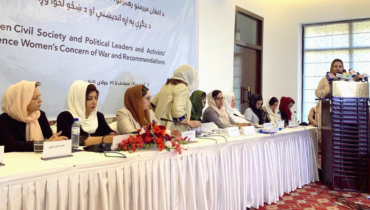The confirmation hearings of Secretary James Mattis and Secretary of State nominee Rex Tillerson offered a glimpse into how key Trump appointees view gender with respect to foreign policy. Senators from the Senate Foreign Relations Committee and the Senate Armed Services Committee grilled the candidates on issues ranging from U.S.-NATO relations to Russia to international human rights. Women’s issues received relatively little air time, but Mr. Tillerson and General Mattis’ few answers indicated a cautious commitment to gender quality and women’s empowerment, which we hope they will continue to uphold once in office.
Sen. Jeanne Shaheen (D-NH) asked Mr. Tillerson about women’s rights in the developing world. Mr. Tillerson spoke of his personal involvement in the issue of developmental aid that targets women and gender equality. Reflecting on his charitable work as CEO of ExxonMobil, Mr. Tillerson stressed that he had “seen first-hand the impact of empowering women, particularly empowering women’s participation in economic activities” in the developing world. He made a commitment to continue American assistance in this field: “I think that it is an important part of all of our foreign aid assistance efforts whether it is through USAID or whether it’s through other opportunities that we have in more structured ways.”
Sen. Shaheen noted that, under Tillerson’s leadership, ExxonMobil’s foundation “helped develop a roadmap for promoting women’s economic empowerment that specifically cited access to family planning and reproductive health services as a means to improve productivity and earning potential for women.”, In response to the question of whether he would pledge to “continue to prioritize quality family planning and reproductive health services for women worldwide,” Mr. Tillerson was more cautious and answered that he would “would want to, if confirmed,” but only after he had had “the opportunity to examine all of the aspects of that program” and taken into account the “statutory requirements in place around the foreign aid.” Considering that one of President Trump’s first acts as President was to re-instate a global ‘gag rule’ that bars any US foreign aid from going to NGOs that provide counseling on abortion services, it is unclear how much Mr. Tillerson and the Department of State will continue to support international family planning and reproductive health services moving forward.
Another crucial facet of women’s empowerment, especially in the field of WPS, is women’s participation in the U.S. armed forces. This topic was brought before General Mattis during his confirmation hearing. The Secretary of Defense re-committed to a gender-blind recruitment policy for the armed forces, saying that the “very, very high recruiting standards” in place were sufficient standards to judge qualifications and abilities.
Despite these encouraging commitments to gender equality, General Mattis was unwilling to account for his earlier statements about rolling back the opening of infantry and Special Forces positions to women, telling Senator Kirsten Gillibrand (D-NY): “Senator, I was not in a position to go back into government when I made those statements.” He insisted that he was not going into his new position “looking for problems,” and said that what mattered to him above all else was military readiness. He did not make clear how this criteria would be applied for infantry and Special Forces positions with regards to gender. However, he said he had “no plan to oppose women in any aspect of our military” and did not believe that there was anything innate in being a woman or LGBT that would cause him to believe that they could not be part of an effective American armed force. Those in the field of WPS will be anxiously waiting to see what policies our new Secretary of Defense will implement to keep these important commitments.
These confirmation hearings give the American people and the WPS community a window into their new administration’s policies towards women. Though recent executive orders and speeches from President Trump indicate that programming and policies supporting women may be under threat, the statements from Mr. Tillerson and General Mattis show that some members of the new administration continue to value gender equality and empowerment and are open to new forms of cooperation and improvement in this area.
About the Author
Annabelle Timsit is the undergraduate Research Assistant at the Institute for Women, Peace and Security. She is a second year student in the School of Foreign Service at Georgetown University, and is majoring in International Politics with a concentration in Foreign Policy.


